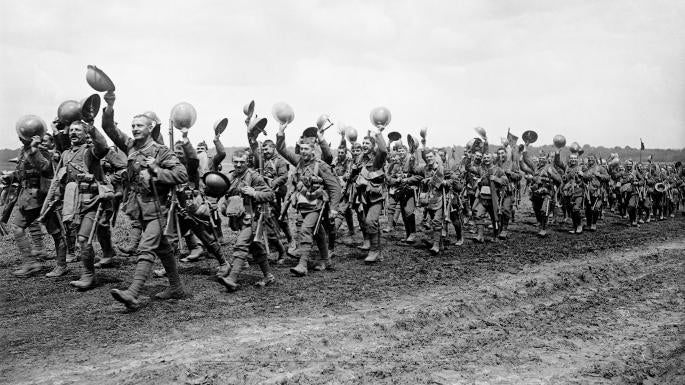 "Cé hé sin" (michael-m-mouse)
"Cé hé sin" (michael-m-mouse)
06/27/2016 at 15:15 • Filed to: World War 1, The Somme
 2
2
 7
7
 "Cé hé sin" (michael-m-mouse)
"Cé hé sin" (michael-m-mouse)
06/27/2016 at 15:15 • Filed to: World War 1, The Somme |  2 2
|  7 7 |
Here we have some happy chappies off to get slaughtered.
One hundred years ago today in Picardie in northern France these soldiers of the 4th Battalion of the Worcestershire Regiment of the British Army were asked to cheer for the camera on their way to the trenches at Acheux-en-Amiénois.
Little did they know.

 Svend
> Cé hé sin
Svend
> Cé hé sin
06/27/2016 at 15:31 |
|
I did Wilfred Owen and Seigfried Sassoon in my final year of secondary school in English literature. The way they conveyed the horror of war was completely opposite to the romance of previous war poets.
The one that will always stick with me is Dulce Et Decorum Est, later renamed ‘not waving but drowning’. The original name coming from a Roman poet, Horace ‘Dulce Et Decorum Est, Pro Patria Mori’ (It Is Sweet And Honourable To Die For One’s Country).
Wilfred Owen paints such a picture in your minds eye that you can’t help but be horrified.
Lest we forget the Men of yesterday, who gave their todays for our tomorrows.
 ttyymmnn
> Cé hé sin
ttyymmnn
> Cé hé sin
06/27/2016 at 15:32 |
|
The War to End All Wars™. Would that it were so. Sadly, war only begets war.
 Azrek
> Cé hé sin
Azrek
> Cé hé sin
06/27/2016 at 15:33 |
|
If you get bored, look for airborne or satelite photos of WW1 battlefields. You can still see the trenches and pockmarks from explosions.
 Jcarr
> Cé hé sin
Jcarr
> Cé hé sin
06/27/2016 at 15:47 |
|
I’m currently in the middle of the Blueprint for Armageddon podcast series by Dan Carlin. If you haven’t checked it out, you should. It’s a fantastic account of WWI.
 ttyymmnn
> Svend
ttyymmnn
> Svend
06/27/2016 at 16:30 |
|
Fantastic poets all, but for a more modern take on the carnage of war, I would recommend the works of Randall Jarrell.
http://www.poemhunter.com/poem/losses/
 Svend
> ttyymmnn
Svend
> ttyymmnn
06/27/2016 at 16:42 |
|
I’ll have to look at that in the morning after work. The page won’t load onto my phone for some reason.
I only got into WWI poetry with it at school. It opened a curiosity and I looked for similar works outside of the curriculum.
I started getting interested in WWII and the history of my city both at home and how people from it have affected the world such a Jessie Janet Woodrow, mother of the 28th President of the United States. But there is so much information and history out there it’s hard to delve below the surface on all of it without specialising in just one theatre.
 ttyymmnn
> Svend
ttyymmnn
> Svend
06/27/2016 at 16:53 |
|
I was always interested in war history, particularly WWII and aviation, but the book that truly opened my eyes to history was The March of Folly by the Pulitzer Prize winning American historian Barbara Tuchman. Tuchman is a very approachable, readable historian with a keen eye to important details and the bigger context of history. I can recommend all of her works without reservation. For an excellent history of WWII, I can recommend The Second World War , which was written by the eminent British military historian (and Socialist, interestingly) JFC Fuller. You can skim past the nuts-and-bolts descriptions of the battles for his larger take on the strategies, both military and political, of the war. It’s really quite fascinating, and Fuller pulls no punches.